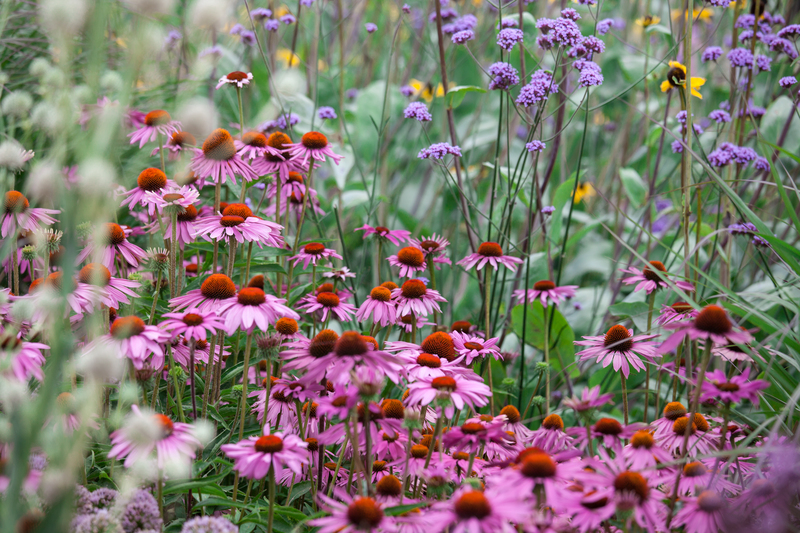Composting: Nature's Recipe for Rich Soil
Posted on 25/08/2025
Composting: Nature's Recipe for Rich Soil
Composting is one of the most effective and sustainable techniques to enhance soil fertility, reduce waste, and support a greener planet. This organic process transforms food scraps, leaves, and yard waste into a nutrient-rich fertilizer. Discover how nature's own recycling method can turn everyday waste into rich, healthy soil for your plants and gardens.
What Is Composting?
Composting is a natural process in which organic matter, such as dead leaves, grass clippings, and kitchen scraps, is broken down by bacteria, fungi, and other microorganisms. This decomposition produces dark, crumbly soil called compost--nature's own recipe for a thriving garden.
Understanding the Science Behind Compost
Composting is facilitated by the work of millions of tiny organisms. Microbes like bacteria and fungi, as well as larger organisms like earthworms and insects, feast on the organic waste, breaking it down into simpler molecules. This complex web of life converts waste into humus, a stable form of organic matter that is packed with nutrients critical for plant growth. In short, composting turns waste into life.

Why Compost? The Benefits of Composting for Soil and the Environment
- Enriches soil with vital nutrients, improving soil structure and fertility
- Reduces landfill waste by recycling organic material instead of sending it to landfills
- Lowers greenhouse gas emissions by preventing methane production in landfills
- Improves water retention in soil, reducing the need for chemical fertilizers and irrigation
- Promotes healthier plants by suppressing soil-borne diseases and pests
Composting for rich soil has profound advantages for gardeners, farmers, and anyone seeking a more sustainable lifestyle.
The Essentials of Composting: What You Need to Get Started
Getting started with composting is simple. You'll need a blend of carbon-rich ("brown") and nitrogen-rich ("green") materials, some moisture, oxygen, and time. Here's how you can begin:
What Can You Compost?
Most organic materials from your kitchen and garden can go into your compost bin, but it's important to know what works best. Compost-friendly materials include:
- Fruit and vegetable scraps
- Eggshells
- Coffee grounds and tea bags
- Grass clippings
- Dried leaves
- Small branches and twigs
- Paper towels and napkins (unbleached, non-printed)
What to Avoid in Your Compost
- Dairy, meat, and oily foods (these can attract pests)
- Diseased plants
- Pet waste
- Glossy or coated paper
- Synthetic materials
The Composting Process: Step-by-Step Guide
1. Choose Your Compost Bin or Pile
You can compost in a variety of ways: outdoor piles, bins, tumblers, or even indoor composters. Select a spot that's convenient but not too close to your home to avoid potential odors. Compost bins help keep things tidy, while open piles work well for large gardens or rural areas.
2. Gather Your Browns and Greens
The key to successful composting is balancing your brown and green materials:
- Browns: Carbon-rich materials (dry leaves, straw, paper, cardboard)
- Greens: Nitrogen-rich materials (kitchen scraps, grass clippings, coffee grounds)
A successful pile should contain about three parts browns to one part greens.
3. Build Your Pile
Start with a layer of coarse materials (twigs, straw) at the bottom for aeration. Then alternate layers of greens and browns, making sure to moisten each layer as you go. Avoid saturating the pile; it should be as damp as a wrung-out sponge.
4. Maintain Your Compost
Turn your pile every few weeks to provide oxygen, which speeds up decomposition and prevents unpleasant odors. If the pile seems too dry, add water or moist greens. If it's too wet or smelly, mix in more dry browns or leaves.
5. Harvest Your Compost
In a few months to a year, depending on conditions, your compost will turn dark and crumbly and have a rich, earthy smell. Sift out any large, undecomposed material and apply the finished compost to your garden beds, lawn, or potted plants.
Compost Varieties: Which Method Is Right for You?
There are several ways to create compost, each suitable for different needs and situations:
Backyard Composting
The most popular method for gardeners and homeowners, backyard composting relies on open piles or bins. It's easy, cost-effective, and produces plenty of material for garden use.
Vermicomposting
Vermicomposting uses worms--usually red wigglers--to break down organic material, creating high-quality worm castings. This method is ideal for apartments or indoors, generating nutrient-dense soil amendments.
Tumbler Composting
Compost tumblers are enclosed barrels that can be rotated to mix materials easily. They speed up decomposition and help avoid pests, making them a tidy choice for urban or suburban settings.
Bokashi Composting
Bokashi is an anaerobic (oxygen-free) process that ferments kitchen scraps using a special bran. It's fast, odor-free, and suitable for all food wastes--including dairy and meat.
Compost for Rich Soil: How Good Compost Benefits Plants
You're not just making less trash--you're creating nature's best fertilizer. High-quality compost offers critical advantages over synthetic fertilizers:
- Improves soil texture, making sandy soils hold water and clay soils drain faster
- Feeds beneficial soil microbes that support plant immunity and healthy roots
- Provides slow-release nutrients, including nitrogen, phosphorus, and potassium
- Reduces plant diseases and pests
- Encourages strong, vigorous plant growth
How to Use Compost in Your Garden
Applying compost is straightforward. Mix it into garden beds before planting, top-dress perennials, sprinkle on lawns, or use it in potting mixes. Even a small amount improves soil quality and plant health significantly.
Frequently Asked Questions About Composting
How long does it take for compost to be ready?
Depending on the method and conditions, compost can take anywhere from two months to a year to mature. Warmer, well-aerated piles with the right balance of greens and browns break down faster.
Is composting difficult or time-consuming?
Not at all! While traditional piles require turning, methods like vermicomposting or tumblers require less effort. Once established, composting becomes a simple habit of collecting and combining kitchen and yard waste.
Will composting attract pests?
If you avoid putting animal products and greasy foods in your compost, and keep it properly covered, pests are rarely a problem. Enclosed bins or tumblers further reduce the risk.
Is composting smelly?
When properly managed, compost has a pleasant, earthy aroma. Bad smells indicate too much moisture, insufficient aeration, or excess nitrogen-rich material. Fix imbalances by adding dry, carbon-rich browns and turning your pile.
Composting Tips and Tricks for Success
- Chop larger items into smaller pieces to speed up decomposition.
- Keep your compost moist, but not soggy.
- Turn your pile regularly to provide oxygen and mix materials.
- Avoid weeds and plants treated with chemicals in your compost.
- Layer greens and browns to maintain a healthy microbial balance.
- Invest in a compost thermometer to monitor internal temperature--a hot pile decomposes faster.
Community Composting: A Solution for Urban Living
For those who lack yard space or want to compost on a larger scale, community composting or municipal drop-offs are emerging solutions. Many cities now offer green waste bins or local gardens where residents can deposit organic waste. Participating in community-led initiatives not only reduces landfill waste but also fosters eco-conscious neighborhoods.

The Future of Composting: Sustainability and Soil Health
As the world seeks to reduce environmental impact, boost soil health, and grow resilient food systems, composting is more important than ever. Countries and cities are increasingly supporting composting programs, while innovations in compostable packaging and home composting devices make it easier for everyone to participate.
Whether you maintain a small worm bin, a backyard heap, or join a community garden, composting is a powerful step toward a sustainable future. With every banana peel and coffee filter you compost, you help heal the planet--turning kitchen waste into rich, productive soil that will nourish generations to come.
Conclusion: Embrace Compost--Nature's Recipe for Rich Soil
Start composting today and be part of nature's endless cycle of renewal. Enjoy healthier plants, cut down on landfill waste, and enrich your local environment. With these simple steps, composting for rich soil is possible for everyone, anywhere. Make the change--nature's recipe is waiting for you.
Latest Posts
A Green Thumb's Journey to a Lush Herb Garden
Transform Your Space with 5 Low Cost, Easy-Care Garden Ideas
The Aesthetic Artistry of Hedge Trimming: Shape and Skill



